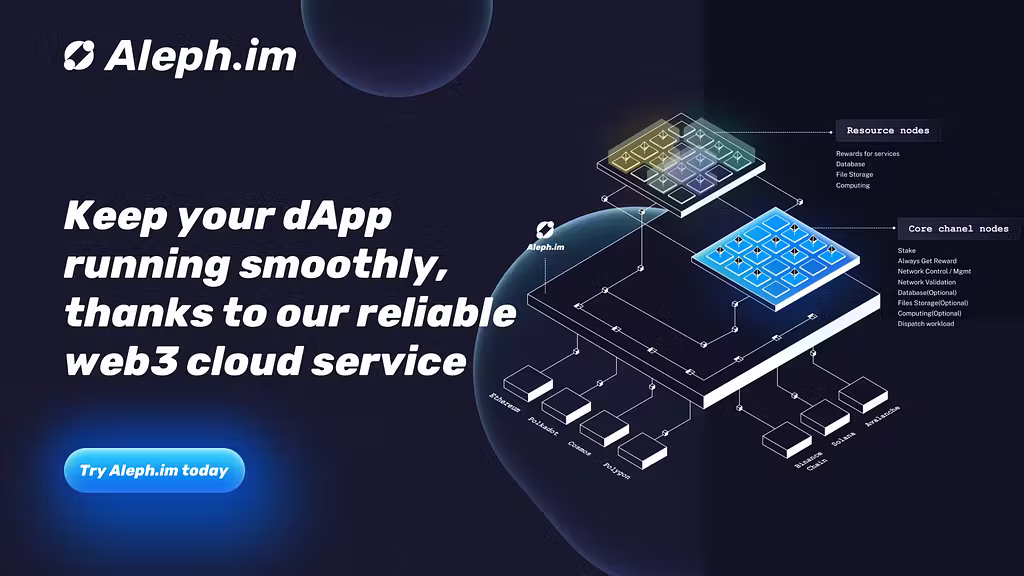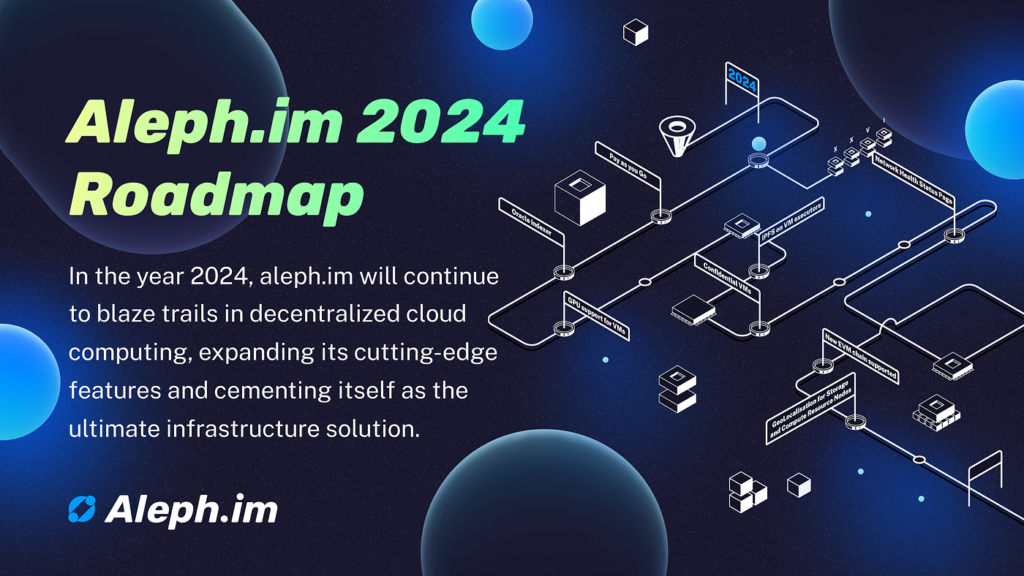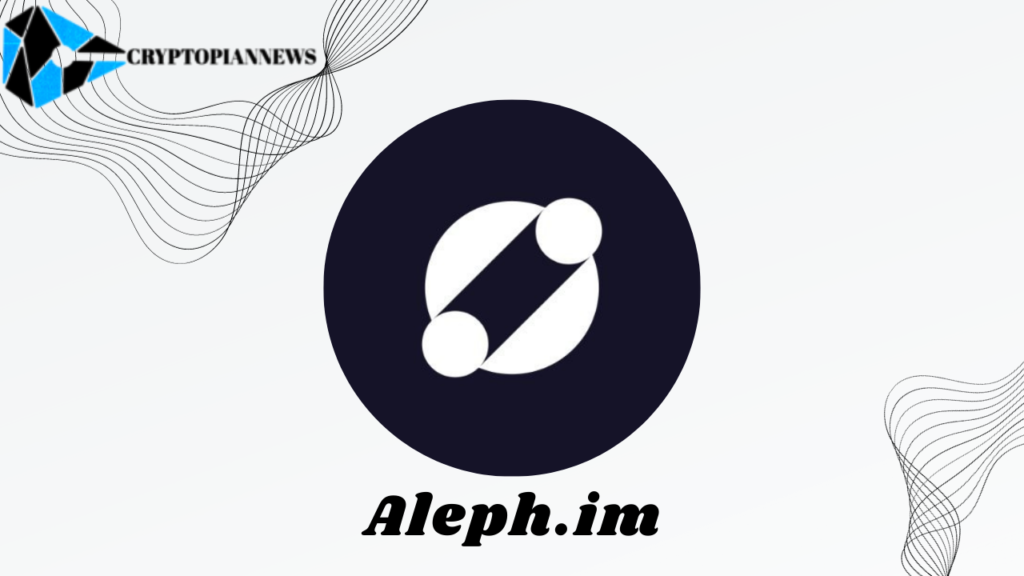What is Aleph.im?
Aleph.im is a decentralized cloud platform that offers a wide range of services including data storage, computing power, and decentralized applications (DApps) hosting. It aims to provide a secure, scalable, and cost-effective solution for individuals and businesses seeking to leverage decentralized technologies.
Key Features of Aleph.im
Security and Privacy
Aleph.im prioritizes security and privacy, employing encryption protocols and decentralized storage to ensure data confidentiality and integrity. Users retain full control over their data, eliminating the risks associated with centralized storage solutions.
Scalability
With its decentralized architecture and peer-to-peer network, Aleph.im offers scalability beyond traditional cloud services. It can dynamically scale resources based on demand, accommodating fluctuating workloads without compromising performance.
Interoperability
Aleph.im promotes interoperability by supporting various blockchain protocols and standards. This enables seamless integration with existing systems and applications, facilitating the development of decentralized ecosystems.

Use Cases of Aleph.im
Decentralized Applications (DApps)
Developers can utilize Aleph.im to build and deploy DApps without relying on centralized infrastructure. This allows for greater resilience and censorship resistance, enhancing the overall user experience.
Enterprise Solutions
Enterprises can leverage Aleph.im for secure data storage, identity management, and decentralized governance. It provides a decentralized infrastructure that reduces operational costs and enhances data sovereignty.
DeFi (Decentralized Finance) Platforms
DeFi platforms can benefit from Aleph.im’s scalability and security features. It enables efficient transaction processing, liquidity provision, and smart contract execution, fostering innovation in the decentralized finance space.
Advantages of Using Aleph.im
Cost-effectiveness
By eliminating intermediaries and reducing infrastructure costs, Aleph.im offers a cost-effective alternative to traditional cloud services. Users only pay for the resources they consume, resulting in significant cost savings over time.
Accessibility
Aleph.im provides universal access to decentralized services, regardless of geographical location or institutional barriers. This promotes inclusivity and democratizes access to cutting-edge technologies, empowering individuals and communities worldwide.
Flexibility
With its modular architecture and customizable solutions, Aleph.im caters to diverse use cases and requirements. Users can easily tailor the platform to meet their specific needs, whether it’s hosting DApps, managing data, or executing smart contracts.

How Aleph.im Works
Aleph.im operates on a decentralized network of nodes that collectively provide storage, computing, and networking capabilities. It utilizes a consensus mechanism to validate and secure transactions, ensuring the integrity of the network.
Comparison with Traditional Cloud Services
Centralization vs. Decentralization
Unlike traditional cloud services that rely on centralized data centers, Aleph.im distributes resources across a global network of nodes. This decentralized approach enhances resilience, fault tolerance, and censorship resistance, mitigating the risks of single points of failure.
Performance and Reliability
Aleph.im offers comparable performance and reliability to traditional cloud services, thanks to its distributed architecture and optimized protocols. It can deliver low-latency responses and high-throughput transactions, meeting the demands of enterprise-grade applications.
Future Potential of Aleph.im
Aleph.im is poised to revolutionize various industries, including finance, healthcare, supply chain, and gaming. Its decentralized infrastructure opens up new possibilities for innovation and collaboration, driving the adoption of blockchain technologies worldwide.
Challenges and Limitations
Adoption Barriers
Despite its potential benefits, Aleph.im faces challenges related to adoption and awareness. Many organizations are hesitant to embrace decentralized technologies due to regulatory uncertainty, interoperability concerns, and legacy infrastructure dependencies.
Regulatory Concerns
The regulatory landscape surrounding decentralized technologies is constantly evolving, posing legal and compliance challenges for projects like Aleph.im. Regulatory clarity and industry standards are essential for widespread adoption and integration into existing ecosystems.
Security Measures of Aleph.im
Encryption Protocols
Aleph.im employs state-of-the-art encryption protocols to secure data transmission and storage. It utilizes cryptographic algorithms and key management systems to ensure confidentiality, integrity, and authenticity across the network.
Data Redundancy
To enhance fault tolerance and data durability, Aleph.im implements data redundancy mechanisms such as sharding and replication. This ensures that data remains available and accessible even in the event of node failures or network partitions.
Community and Partnerships
Aleph.im actively collaborates with blockchain projects, developer communities, and industry stakeholders to foster innovation and adoption. It offers developer tools, documentation, and support channels to facilitate the integration of Aleph.im into existing applications and workflows.

Recent Developments and Updates
Aleph.im regularly releases updates, bug fixes, and performance improvements to enhance the platform’s functionality and stability. Community feedback and contributions play a crucial role in shaping the roadmap and priorities of Aleph development.
Case Studies
Real-world examples of Aleph.im implementation
- Healthcare: Aleph.im facilitates secure medical data exchange and patient record management, enabling healthcare providers to streamline operations and improve patient outcomes.
- Supply Chain: Aleph.im powers decentralized supply chain solutions, enhancing transparency, traceability, and trust across the entire supply chain ecosystem.
- Gaming: Aleph.im enables the creation of decentralized gaming platforms and virtual economies, empowering gamers and developers with new monetization models and incentives.
Conclusion
Aleph.im is at the forefront of decentralized cloud technology, offering a robust and scalable infrastructure for a wide range of applications and industries. With its emphasis on security, scalability, and interoperability, Aleph.im is poised to reshape the future of computing and data management. By overcoming adoption barriers and addressing regulatory concerns, Aleph.im aims to accelerate the transition towards a decentralized and inclusive digital economy.
FAQs
Is Aleph.im suitable for small businesses?
Yes, Aleph.im offers flexible pricing plans and scalable solutions that cater to the needs of small businesses and startups.
How does Aleph.im ensure data privacy?
Aleph.im utilizes encryption protocols and decentralized storage to protect user data from unauthorized access and tampering.
Can I migrate my existing applications to Aleph.im?
Yes, Aleph.im provides tools and documentation to facilitate the migration of existing applications to its decentralized infrastructure.
What blockchain protocols does Aleph.im support?
Aleph.im supports various blockchain protocols, including Ethereum, Binance Smart Chain, and Polkadot, ensuring interoperability and compatibility with existing ecosystems.
Is Aleph.im open source?
Yes, Aleph.im is an open-source project with a vibrant community of developers contributing to its development and evolution.
STACKS (STX) COIN REVIEW AND FUNDAMENTAL ANALYSIS
GMX COIN REVIEW: WHAT YOU NEED TO KNOW
ALEPH ZERO: A COMPREHENSIVE REVIEW AND FUNDAMENTAL ANALYSIS



